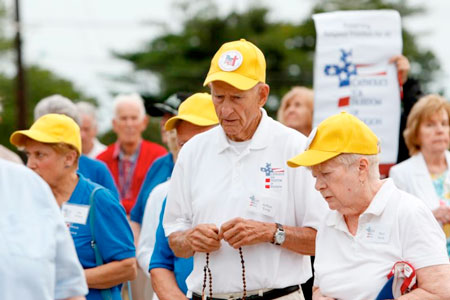
This is the first of a series on the issues facing the electorate in the presidential campaign.
By Tom Tracy
WEST PALM BEACH, Fla. (CNS) – With every passing U.S. election cycle, First Amendment and religious freedom-minded voters and watchdogs might be tempted to think, “This is the election that will most matter in our lifetimes.”
But as recent years have brought a wave of religious liberty court battles and the federal contraceptive mandate infringing on an array of operations by church entities – along with a U.S. Supreme Court vacancy to be filled – 2016 might be a seminal electoral year.
“I have been doing this 25 years, and I don’t recall the same level of concern,” said Mark Harrington, executive director of the Ohio-based Created Equal, a nonsectarian pro-life organization, who spoke with Catholic News Service about the upcoming religious liberties landscape in light of the presidential campaign.
Harrington pointed out he was part of an audit in 2009 by the Internal Revenue Service (IRS) following comments he made about one of the presidential candidates. He said he speaks as a private individual when he asserts that he worries about the pace at which federal government has been chipping away at freedom of speech and religious liberties under the current administration.
“Each cycle I keep saying this is the most important election in my lifetime and this one really is, because of the Supreme Court mainly,” Harrington said, referring the vacancy left this year by the death of Supreme Court Justice Antonin Scalia, the leading conservative voice on the court.
“Whatever is decided (this year), those two issues – religious liberty and abortion – hang in the balance, and if the Supreme Court would tilt to the left, we could see an entire generation pass before we get back to a place where the courts protect life and religious liberty,” he said.
“It is clear First Amendment liberties are being threatened.”
Without endorsing candidates or parties, Harrington said he predicts that if elected president, Democratic nominee Hillary Clinton would continue with President Barack Obama’s domestic policies of curtailing religious liberties. Harrington sees some relief in Republican nominee Donald Trump’s recent statements, saying that Trump, if elected, would consider doing away with the so-called Johnson Amendment, which threatens religious institutions with the loss of their tax-exempt status if they openly advocate their political views.
“I don’t know if (Trump) would get it done, but organizations like ours would love to see that happen and to see that stripped. The Johnson Amendment initially was never intended to be used to stymie free speech,” said Harrington, who said his organization prevailed after an IRS investigation but that the process itself was a kind of punishment for perceived partisanship rather than pro-life principles.
Trump also has vowed to appoint judges and justices who will uphold law as it is written in the Constitution and not rewrite law based on a political agenda; he has released a list of 11 potential Supreme Court nominees.
“We can direct people to vote on the issue of abortion, to vote pro-life, and leave it up to the individual to reason which candidate is for or against abortion, to let people know where candidates stand,” Harrington said. “With Mr. Trump, he has to answer to his Republican caucus, which in the case of the U.S. House, has become more conservative, so I would feel very comfortable with a Trump presidency protecting religious liberty.”
In Chicago, Tom Brejcha, president and chief counsel of the Thomas More Society, which is fighting religious freedom court battles around the country, noted that he “is not a fan” of either the Democratic or Republican candidates and that he expected his organization will be busy no matter who is elected president.
Brejcha does point out that the rhetoric from the Democratic nominee and her running mate, Tim Kaine, strike him as more openly anti-religious and anti-Catholic – a potentially even more vigorous continuation of what many say are Obama’s anti-religion policies.
“All the elections are important, but this one is pivotal to religious liberty in so many ways, which is the first liberty the freedom of belief,” Brejcha said. It’s well past time for Catholics to wake up and see that the government is trying to take over our religion and that is not an understatement in the slightest.”
